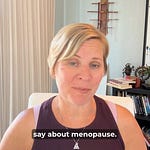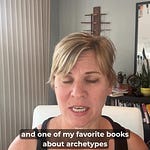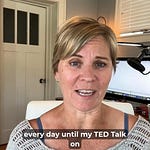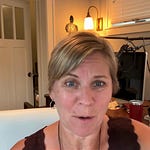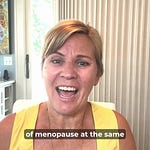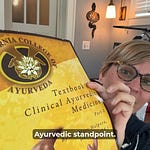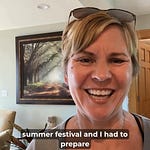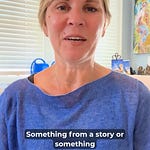The Main Stage Event
I’m writing this post partially to share with my readers, and also for posterity's sake. I spent so much time preparing for this audition, I want to remember how it all went down.
First, if you’re not familiar with TED Talks, you might want to change that! They are brief, concise talks given by thought leaders of any industry —from science to medicine to self-care to personal growth to, well, anything.
The point of a TED Talk is all about the power of ideas. The best TED talks are those that offer an entirely new idea, or, at least, a new way of thinking about an old idea. My favorite TED talk ever is entitled “Why Some of Us Don’t Have One True Calling, by Emilie Wapnick. Her idea of some of us being “multi-potentialities” has stuck with me since the day I saw it.
I have always loved watching TED talks, not only for the ideas but for the skills of the presenters. I’m one of those people that enjoys public speaking—however, that doesn’t mean it doesn’t make me incredibly nervous. But, I tend to enjoy engaging with an audience, whether I’m sharing a personal story, teaching a new topic, or inspiring a group of seekers. So, I like to watch and learn how others do it, and continuously improve my craft.
All this to say—I’ve always wanted to manifest being a TED talk speaker.
“Our intention creates our reality.”
~Wayne Dyer
But, traditional TED Talk opportunities are notoriously hard to get. I don’t know the process exactly, but you do need an invite, and I don’t know how often they have open calls for auditions.
A TEDx talk (with the x following), however, is a slightly more accessible way to break in. The x stands for a particular city, so, for instance, I applied to TEDx Edina, a city in Minnesota, where I live. There are dozens of these throughout the country.
My understanding is that if you do a fabulous TEDx talk, it might be shared on the main TED Talk pages! In other words, this is a huge opportunity to get a new idea across!
What’s the Big Idea?
“Everything begins with an idea.”
~Earl Nightingale
To be considered to audition in person, you have to first fill out a proposal with your “big idea.” There are specific requirements to follow, including word count, so it’s worth taking your time.
The application I filled out was interactive, but I clicked through it all, grabbed the questions, and then canceled out. Then, I worked on the questions in a separate document.
It takes time and effort, I discovered, to distill great ideas down to your one Big Idea. So many tangents of thoughts and tidbits come up, and they all seem important. For me, this is where all the work I’ve done on self-editing came in super handy! Distill and tighten, clarify and enhance.
Then, I sent my application to two trusted friends who I knew understood my message and would help me further enhance and tighten.
Then, send it in, and wait.
Can You Share it in Three Minutes or Less?
When the email came that I was officially through the first stage of the process, I was so elated I cried happy tears. I’ve been through the wringer with rejections in these last couple of years, so to get an acceptance was, well, incredibly exciting. Especially for something that has been a part of my dream for so many years.
The next step was to distill even further. We had to present our idea in under three minutes! That’s only about 400 words! No easy task! What stays, what goes, how do you give enough information that people who’ve never seen you before will understand what you’re talking about, and yet leave them curious for more?
I started with a Word document and just kept cutting, cutting, and cutting.
Finally, it was time to start practicing. How we write and how we talk are quite different, so this step was about finding a flow and cadence of words that felt right together when spoken out loud. I wanted variety in the length of the sentences, as well as a mix of personal stories, rhetorical questions, thesis statements, and summary sentences.
Then, it was time to get rid of the text, and just get it memorized. I haven’t had to memorize anything for so long, and honestly, I wasn’t entirely sure I could do it. But—I had time on my side. How many times can someone practice a 2–3 minute speech in two-weeks time? Hundreds, it turns out. I practiced numerous times per day, every day. I gave the talk to my husband, my daughters, a couple of friends. Like a piece of clay, I kept refining, smoothing, and shaping.
There’s Imagination, and There’s Reality
The auditions were held at a local high school auditorium. I went earlier in the day to make sure I knew where to park and where to enter —logistical things can really stress me out if I don’t know them ahead of time!
I got there about half an hour before my talk. In my mind, I was envisioning all of us speakers waiting in the wings, lined up. Instead, we were invited to simply take a seat in the auditorium until it was our turn. This was much more casual than I was expecting and, in some ways, calmed my nerves.
Also, in my imagination, I pictured the whole process, and the people, being very strict and serious. But while they were timely and organized, the organizers were friendly and supportive. I felt welcomed and as comfortable as anyone would feel 30 minutes before giving the talk of their life!
There’s only one thing that threw me: I had expected to be given a headset, so I could have my hands free, and walk about the stage, just like you would see in a Ted Talk. I talk with my hands, and, in fact, some of my hand motions were quite practiced and an important part of the speech. But they did not give us headsets. Instead, there was a microphone that we could either stand behind or hold. I choose to stand behind it, which limited my ability to move, but at least gave me the use of my hands.
It’s Over Before You Know it
As much as I worried that I’d forget something, or lose my place, I’d practiced so many times it was like a favorite song coming on the radio: I just did it. My voice squeaked a couple of times from nerves which, honestly, I can’t remember ever happening in my life! But hey — it’s not about perfection, it’s about completion! And that I did. I went through my talk, and before I knew it, the time was up.
Now What?
Now, I wait. We are to find out in less than a week. I very much hope that I get it. But—I also know that just going through this process has been so incredible for me. The distilling work I did will help me pitch my next book, and it helps me better understand what my current work is really all about, as well.
If I don’t get it, I’ll be incredibly disappointed. But you know what I’ll do? I’ll try the whole thing over again.







